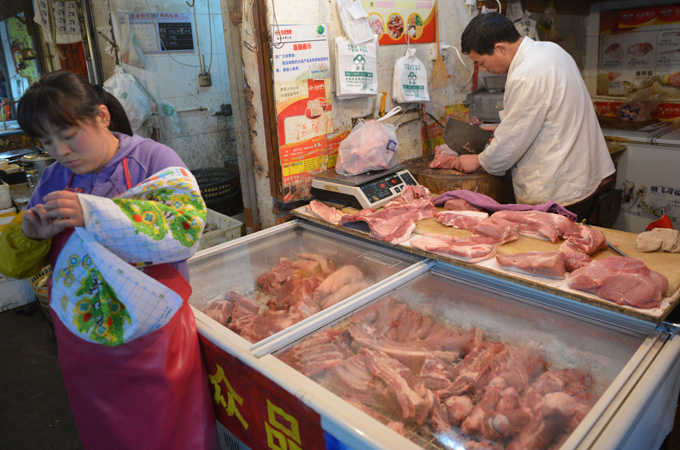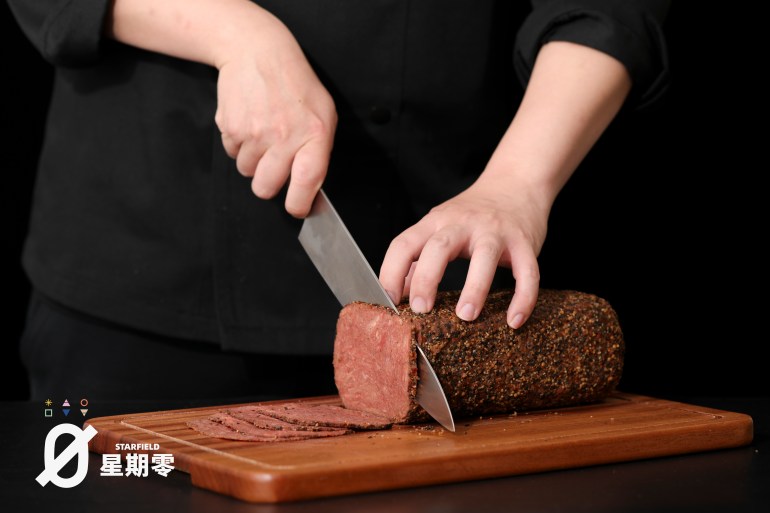In meat-loving China, mavericks see future in plant-based protein
There is a growing appetite for alternatives to meat in the world’s most populous nation.

Hong Kong, China – Kate Tu, a 31-year-old English teacher in southwest China’s Yunnan province, is used to getting strange looks when she tells people she doesn’t eat meat.
“My family thinks I’m crazy for being vegetarian,” Tu, who lives in the city of Dali, told Al Jazeera. “They don’t understand. They can’t understand. They will never understand this lifestyle.”
Keep reading
list of 4 itemsKremlin critic Navalny sentenced to nine extra years in prison
Zelenskyy says compromise with Russia will be put to a referendum
Malawi begins nationwide polio immunisation campaign
For Tu’s friends and family, eating meat every day is considered a necessary part of a healthy diet.
“They think I’m malnourished and should eat red meat because it’s good for my health,” said Tu, who transitioned to a plant-based diet about a year and a half ago. “My sister recently told me that if you keep eating like this, sooner or later you’ll end up in hospital.”
“They’ve got it wrong,” she added. “It’s their meat diets that are unhealthy.”

China is by far the world’s largest consumer of meat, with citizens expected to eat more than 53 million tonnes of pork and 10 million tonnes of beef and veal in 2022, according to the US Department of Agriculture.
Nonetheless, there is a growing appetite for sustainable alternatives to meat in the world’s most populous nation.
China’s vegan food market is forecast to be worth nearly $12bn by 2023, up from just under $10bn in 2018, according to a report by Euromonitor International. A 2020 study by DuPont pinpointed China as one of the fastest-growing global markets for plant-based proteins, predicting demand for meat alternatives to increase by 200 percent over the following five years, driven by greater interest in health and sustainability.
Beijing appears to be warming up to the market potential. In its latest development plan released in January, the Ministry of Agriculture and Rural Affairs for the first time included cultivated meats and other “future foods” as part of its roadmap for food security. A reduction in meat production will also be critical for China to meet its greenhouse gas emissions target of becoming carbon neutral by 2060.
The United Nations has described meat production as the world’s most pressing problem, warning that an overreliance on the protein has brought humanity to “the verge of catastrophe.”
The environmental impact of China’s consumption habits is a particular concern for the planet due to the country’s more than 1.4 billion-strong population and rapidly growing middle class.
Five-fold increase in meat consumption
Amos Tai, an expert in environmental science at the Chinese University of Hong Kong, said the rapid uptick in China’s meat consumption could already be linked to environmental problems in the country.
“In 30 years, there has been a five-fold increase in China’s per capita meat consumption, which has contributed to nearly 20 percent of the air pollution in the country,” Tai told Al Jazeera.
Tai said Beijing understands that reducing meat consumption will be key to meeting its environmental goals.
“There’s a climate and environment motivation for the government, as well as a realisation that this action could alleviate the existing pressure on land, forest and water resources,” said Tai.
As the demand for alternative protein grows in China, companies are scrambling for a slice of the pie.
In January, Shenzhen-based startup Starfield Food Science and Technology raised $100m in China’s largest funding round for a vegan protein brand to date.
Since its launch in 2019, Starfield has launched products in more than 14,000 restaurants across China, including popular chains Luckin Coffee and Dicos.
Albert Tseng, the co-founder of Dao Foods, Starfield’s first angel investor, sees Beijing’s nod to “future foods” in its agricultural plan as “a good early indicator,” but cautions against overstating the government’s commitment.
“There was one line in the report that talked about future foods and alternative proteins. One line out of 42 pages,” Tseng said. “I think there is still a way to go.”
Tseng, who sees Starfield’s “superpower” as its ability to partner with established brands that already have relationships with consumers, said entrepreneurs in the “nascent” Chinese market still have their work cut out for them.
“We have to prove to the market and to policymakers that this is a route that can actually satisfy the consumer demand for protein, both in terms of their willingness to buy and their willingness to eat this stuff,” he said.

Hong Kong-based dietitian Sally Poon told Al Jazeera “eating meat is closely connected with the growing affluence in China,” which may make moving away a challenge.
In November, a short documentary presented by celebrities Zhang Jingchu and Tao Hong that touted the benefits of a plant-based diet was lambasted by Chinese netizens, who accused the makers of “blind worship” of Western values and disrespecting Chinese habits.
However, Poon said perceptions are changing, especially among the younger generation.
“I think more people realise that overconsumption of meat is not good for one’s health,” she said. “Plant-based concepts are promoted more often in the media these days and this will have some influence on their food choices.”
Tseng echoed the view that young Chinese are more eager to broaden their appetites.
“It’s encouraging that there’s a young millennial population in China that is very willing to try new foods, new things,” he said.
He said Starfield plans to put the $100m funding injection into research and development, boosting production capacity and expanding its marketing strategy.
“We’re at the early stage of these proteins, we have to continually get better and better in terms of the nutrition, taste and texture profiles,” he said. “This is the challenge. They need to be delicious, tasty, and cost-effective.”
For Kate Tu in Dali, as it stands, plant-based meat alternatives are too much to fork out for.
Tu said she is open to incorporating meat substitutes into her diet, but the comparatively high price puts them out of reach for her and millions of others in China.
“If the cost goes down and flavour improves, maybe more Chinese people will eat fake meat and change to a more vegetarian lifestyle,” Tu said. “But I think it will take generations.”